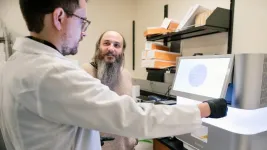Ancestry-specific genetic variants linked to multiple sclerosis risk, new study shows
A landmark study has uncovered novel ancestry-specific genetic variants linked to multiple sclerosis
2024-09-17
(Press-News.org) A landmark study has uncovered novel ancestry-specific genetic variants linked to multiple sclerosis (MS), offering new insights that could reshape treatment approaches for diverse populations affected by the disease.1 The research, presented today at ECTRIMS 2024, is the result of efforts by the Alliance for Research in Hispanic MS (ARHMS) Consortium and is the first large-scale study to identify ancestry-specific genetic effects for MS risk.
In a comprehensive analysis of over 7,000 individuals from self-reported Hispanic (n=4,313; 2,201 MS, 2,112 controls) and African American (n=3,085; 1,584 MS, 1,501 controls) backgrounds, researchers discovered key genetic loci associated with MS risk. The findings highlight the potential of ancestry-informed genetic studies to uncover previously unidentified risk factors for MS and to improve the precision of fine-mapping efforts across different racial and ethnic groups.
A novel genetic locus was identified on chromosome 13q14.2, specifically within African haplotypes (genetic signatures). The variant, rs3803245, is located in a region of the chromosome that is highly open to certain proteins in T-cells, suggesting this region may serve as a regulatory area in T-cells, which are crucial in the pathology of MS.
On chromosome 1p35.2, the research identified two distinct genetic variants associated with MS risk – one specific to Native American haplotypes and the other to European haplotypes. The Native American variant, rs145088108, significantly increases the risk of MS in Hispanics and African Americans (OR=2.05), compared to the European variant, rs10914539 (OR=1.37) (European cohort = 15,000 MS and 27,000 controls).
Dr. McCauley, Professor at the University of Miami Miller School of Medicine and leader of the study, explains, “The variant found in Native American genetic signatures changes the structure of a protein, which might explain why it is more strongly linked to MS risk. In contrast, the variant found in European genetic signatures is in a non-coding part of the gene, making it less clear how it contributes to the disease.”
Through a trans-ethnic meta-analysis, the researchers achieved high-resolution fine-mapping of seven previously identified MS risk loci. Dr. McCauley furthers, “The variants identified within these loci could pave the way for new targeted treatments for MS, some of which may be population-specific. Refining the focus on these regions is highly valuable, and with further replication there is potential for discovering new drug targets in the future."
“While we anticipated some level of genetic diversity, the identification of African and Native American-specific alleles influencing MS risk is both exciting and encouraging. As our cohort grows, we expect to discover even more ancestry-specific alleles that could be critical for understanding phenotypic diversity and addressing health disparities in MS. We are extremely grateful to our study participants and their families for participating in this important research and we encourage additional patients from underrepresented populations to join our efforts."
The study also highlights the importance of considering gene-environment interactions in future research. While the identified variants were largely population-specific, the researchers emphasised the need to explore how environmental and lifestyle factors might interact with these and other genetic variants to influence MS risk. This is especially relevant in diverse populations with varying socioeconomic backgrounds and diets.
Moving forward, Dr. McCauley and colleagues of the ARHMS Consortium plan to conduct functional studies to determine the causal pathways associated with the fine-mapped variants, and to expand their cohorts to discover additional ancestry-specific variants.
ENDS
Notes to Editors
A reference to ECTRIMS 2024 must be included in all coverage and/or articles associated with this study.
For more information or to arrange an expert interview, please contact the ECTRIMS Press Office at: press.ectrims@congrex.com
More about the study and how to get involved:
To find out more about the research and opportunities to participate, please go to:
The Alliance for Research in Hispanic MS (ARHMS)
National MS Society (NMSS)
About the study author:
Dr. Jacob McCauley is a Professor of Human Genetics and Pathology & Laboratory Medicine at the University of Miami Miller School of Medicine and Director of the Center for Genome Technology and Biorepository Facility at the John P. Hussman Institute for Human Genomics. A genetic epidemiologist with expertise in molecular and statistical genetics, Dr. McCauley focuses on disease gene discovery and the impact of environmental factors on disease outcomes. He has been a key figure in MS research since 2005, contributing to numerous large-scale genetic studies.
About the European Committee for Treatment and Research in Multiple Sclerosis (ECTRIMS):
ECTRIMS is a non-profit organisation and an independent representative European-wide organisation devoted to MS. It serves as Europe’s and the world’s largest professional organisation dedicated to the understanding and treatment of MS.
The 40th ECTRIMS Congress takes place between 18-20 September 2024 in Copenhagen, Denmark.
Website: https://ectrims.eu/
References
Novel ancestry-specific and putative causal genetic variants for multiple sclerosis identified by an ancestry-informed regression and trans-ethnic fine-mapping analysis, McCauley, J.L., et al. (2024). Presented at ECTRIMS 2024. END
ELSE PRESS RELEASES FROM THIS DATE:
2024-09-17
New research presented today at ECTRIMS 2024 reveals that initiating monoclonal antibody therapy during childhood, rather than delaying treatment until early adulthood, significantly reduces long-term disability in multiple sclerosis (MS) patients.1
The study, which utilised data from the French MS Registry, Italian MS Register, and the global MSBase Registry, analysed the outcomes of 282 patients with paediatric-onset MS who began experiencing symptoms before the age of 18 years. Patients were divided into two groups based on when they initiated monoclonal antibody treatment: either ...
2024-09-17
Dr. Ali Khademhosseini, Ph.D., CEO and Director of the Terasaki Institute for Biomedical Innovation (TIBI), is honored with the 2024 Andreas Acrivos Award for Professional Progress in Chemical Engineering by the American Institute of Chemical Engineers (AIChE). This distinguished honor recognizes outstanding progress in the field of chemical engineering.
Named after Dr. Andreas Acrivos, Albert Einstein Professor of Science and Engineering, emeritus at the City College of New York, whose pioneering work in fluid ...
2024-09-17
American Geophysical Union
17 September 2024
AGU Release 24-33
For Immediate Release
This press release is available online at: https://news.agu.org/press-release/slow-landslides-growing-threat-mountain-communities/
Slow-moving landslides a growing, but ignored, threat to mountain communities
Urban growth, climate change, and flood risk at lower elevations can push people to live on steeper, more dangerous terrain
AGU press contact:
Rebecca Dzombak, news@agu.org (UTC-4 hours)
Potsdam press contact:
Stefanie Mikulla, University of Potsdam, presse@uni-potsdam.de (UTC+2 hours)
Researcher contact:
Joaquin Vicente Ferrer, ...
2024-09-17
Browser extensions, the software add-ons that help users customize and enhance their web browsers, are wildly popular. Some of the most-used extensions find shopping deals, fix grammar and typos, manage passwords, or translate web pages. The types of extensions available are nearly endless, and many have become indispensable tools for businesses and everyday users.
While these extensions can make web browsing more accessible, productive, and rewarding, they are not without risk. New research from Georgia Tech reveals that thousands of browser extensions pose significant threats to privacy, and hundreds automatically ...
2024-09-17
SAN FRANCISCO—Within bacterial cells, specialized immune systems known as retrons fend off viral attacks. But that’s not all they can do.
Scientists, including Seth Shipman, PhD, at Gladstone Institutes, have shown that retrons also serve an important purpose in the lab: precise DNA editing. In fact, retrons can be combined with CRISPR—the far more famous bacterial-defense-system-turned-gene-editor—to better edit human cells.
Yet, for all their potential to help scientists better understand disease and develop new therapies, only a small number of retrons have been studied. In nature, many thousands of variations exist, some with greater gene-editing powers than ...
2024-09-17
First-of-its-kind research by Tarang Parekh, assistant professor of epidemiology, reviewed the State Innovation Models (SIM), a payment system introduced by the Centers for Medicare and Medicaid Services in 2013, which provides financial incentives to states to develop innovative payment models to improve healthcare systems.
In the study, recently published in the American Journal of Epidemiology, Parekh compared data from 2010 to 2015 from three SIM participating states, Arkansas, Massachusetts and Vermont, to Florida, Nebraska and New Mexico, which do not participate in ...
2024-09-17
BUFFALO, N.Y. – Colorectal cancer (CRC) is no laughing matter. It’s the second-leading cause of cancer deaths globally, according to the World Health Organization. But new research led by the University at Buffalo suggests that humor can be an effective mechanism for reaching people who otherwise avoid information about colorectal cancer screening or other health messaging.
The research, published online ahead of print in the British Journal of Health Psychology, found that in people who demonstrated a ...
2024-09-17
UNIVERSITY PARK, Pa. — A novel neurotechnology treatment known as deep brain stimulation (DBS) can benefit patients with neurological disorders, but it involves surgical procedures with potential risks. Assessing the risk-benefit tradeoffs and the ethics in making decisions about whether to begin such treatments and when can be tricky for both patients and clinicians.
Laura Cabrera, associate professor of engineering science and mechanics, received a four-year, $1.5 million grant from the National Institutes of Health to research and develop ...
2024-09-17
A discovery six years ago took the condensed-matter physics world by storm: Ultra-thin carbon stacked in two slightly askew layers became a superconductor, and changing the twist angle between layers could toggle their electrical properties. The landmark 2018 paper describing “magic-angle graphene superlattices” launched a new field called “twistronics,” and the first author was then-MIT graduate student and recent Harvard Junior Fellow Yuan Cao.
Together with Harvard physicists Amir ...
2024-09-17
SAN ANTONIO, Sept. 17, 2024 – In landmark research, scientists at The University of Texas Health Science Center at San Antonio (UT Health San Antonio) have reported the largest-ever genome-wide association study of dementia from all causes, revealing an overlap of genetic risks including neurodegeneration, vascular factors and cerebral small-vessel disease.
Genome-wide association studies help scientists identify genes associated with a particular disease or trait by exploring the entire set of DNA, or genome, of a ...
LAST 30 PRESS RELEASES:
[Press-News.org] Ancestry-specific genetic variants linked to multiple sclerosis risk, new study shows
A landmark study has uncovered novel ancestry-specific genetic variants linked to multiple sclerosis




